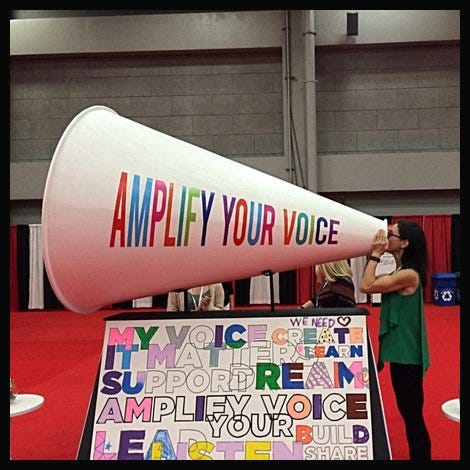Whether you listen to the VoiceOver for accessibility, because you’re more of an auditory learner or so you can grab some movement while we’re together—it will consistently be an option.

A few years back, thanks to this funny smart human, I had the opportunity to speak at the Texas Conference for Women.
As I’d expected the women I met were charismatic, community-builders.
As I’d hoped Amal Clooney was an unbelievable speaker and hearing her share her experiences helping women enslaved by ISIS left me awestruck and longing to be as fearless as she.
Even with all the phenomenal facets of the day, there’s one session which resonated with me above all else.
And, more specific than that, a singular phrase which lingers in my head all these months since the event passed.
But I’m getting ahead of myself.
In fact, backing waaay up, it’s crucial to clarify my aversion for confrontation.
I choose to believe we all dislike it mainly because I cannot fathom someone enjoying scenarios where disagreement occurs in potentially hostile ways.
I attended a session with Lisa Nichols (coach and international speaker) and, during her presentation, latched on to a ‘throw away’ phrase in her talk.
As Lisa detailed for us an experience she’d had she said: “I chose carefrontation over confrontation.”
She continued on to the crux and climax of her story; I remained firmly focused on her 3 words:
CAREfrontation over confrontation.
I knew, if I learned nothing else from the day, what she’d casually uttered was everything I never knew I’d always wanted to hear.
The event continued. I talked, networked, laughed and presented and the phrase percolated in the back of my mind.
I needed to learn how to engage in productive confrontation–something I now possessed a word for: CAREfrontation.
CAREfrontation would lay foundation for margins in my life, facilitate differing, non-combative opinions, and result in my consistently making healthy decisions.
1. Prepare.
When it came to confrontation I knew I needed to plan. I needed to practice what I wanted to convey so as not to get lost in the emotions of the moment. I needed to pause and identify core issues so I’d not get distracted by my own minutiae and ‘lose my listener.’
✔️ I needed to consider what language which best resonated with the other person(s) and use that even if it wasn’t intuitive for me.
✔️ I needed to identify an ideal resolution of the CAREfrontation and not use the interaction to aimlessly ramble or vent.
✔️ I needed to own my part in the story. I needed to focus on I-sentences and not you-statements.
✔️ I needed to visualize the other person’s emotional reactions, body-language, and word choices and use those to ‘see’ a positive outcome and my responding with care not frustration.
✔️ I needed to plan a follow-up with the other person(s) as the more I considered care over confront it grew evident follow-up was where the former revealed itself.
2. Environment.
Once I’d prepared it was incumbent upon me to really consider the where of my CAREfrontation.
Too often, as a direct result of my dreading an interaction, I’d ruminate for a w-h-i-l-e over a confrontation and then seemingly (at least to the other person) spontaneously/apropos of nothing blurt everything out at once and in public.
As with other interactions in my life, I needed to place myself in the position of the other. I needed to consider environmental impact on interpersonal interactions and consciously choose a calm, supportive environment in which to CAREfront.
3. Believe.
Previously I’d entered into confrontations with an attitude of Well, if this doesn’t work at least I’ll feel better!
My brain believed the story I told it and too often that’s exactly what happened: I vented.
The other person didn’t say much. I felt fleetingly better (and then much worse) because it had been a confrontation-go-awry.
I needed to enter with care and with a knowing the other person desired resolution as much as I did.
I couldn’t be too tightly attached to what the outcome would look like, yet I needed to believe there existed solutions, alternatives and compromises.
Changing from a mindset of Perhaps after arguing we will reach a compromise. to a belief in the idea of A focus on what we individually want/need can create a compromise we’re both happy with! shifted everything from my body language to my word choice.
Carefrontation conveys I am invested, dedicated, and committed.
Soon after the conference (not to my surprise-hello Universe!) I encountered a job situation which necessitated I confront a co-worker.
A scenario which, before my new concept, I’d have avoided until it exploded and tiptoed in later in an attempt to clean up the mess.
This time I chose a different approach.
I planned, I staged, I believed our communication would result in a new, clearer path—and it did.
And you?
Do you believe confrontation always equates to argument?
Have you heard of CAREfrontation? How might you put this into practice?





Such a great reminder of choice and intention -- a powerful and respect-filled way of showing up in the world. "Carefrontation conveys I am invested, dedicated, and committed."